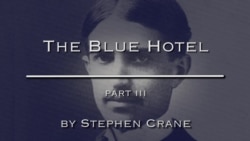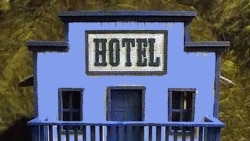We present the third of four parts of the short story "The Blue Hotel," by Stephen Crane. The story was originally adapted by the U.S. Department of State. The audio was recorded and produced by VOA Learning English.
The men prepared to go out. The Easterner was so nervous that he had great difficulty putting on his new leather coat. As the cowboy pulled his fur cap down over his ears, his hands trembled. In fact, Johnnie and old Scully were the only ones who displayed no emotion. No words were spoken during these proceedings.
Scully threw open the door. Instantly a wild wind caused the flame of the lamp to struggle for its life. The men lowered their heads and pushed out into the cold.
No snow was falling, but great clouds of it, swept up from the ground by the fierce winds, were streaming all around. The covered land was a deep blue, and there was no other color except one light shining from the low, black railroad station. It looked like a tiny jewel.
The Swede was calling out something. Scully went to him, put a hand on his shoulder, and indicated an ear.
“What did you say?”
“I said,” screamed the Swede again, “I won’t have a chance against this crowd. I know you’ll all jump on me.”
“No, no, man—” called Scully. But the wind tore the words from his lips and scattered them far.
The Swede shouted a curse, but the storm also seized the remainder of the sentence.
The men turned their backs upon the wind, and walked to the sheltered side of the hotel. Here a V-shaped piece of icy grass had not been covered by the snow. When they reached the spot, it was heard that the Swede was still screaming.
“Oh, I know what kind of a thing this is! I know you’ll jump on me. I can’t beat you all!”
Scully turned on him angrily. “You won’t have to beat all of us. You’ll have to beat my son Johnnie. And the man that troubles you during that time will have to deal with me.”
The arrangements were quickly made. The two men faced each other, obeying the short commands of Scully. The Easterner was already cold and he was jumping up and down. The cowboy stood rock-like.
The fighters had not removed any clothing. Their hands were ready, and they eyed each other in a calm way that had the elements of fierce cruelty in it.
“Now!” said Scully.
The two leaped forward and struck together like oxen. There was heard the dull sound of blows, and of a curse pressed out between the tight teeth of one.
As for the watchers, the Easterner’s held-in breath burst from him in relief, pure relief after the anxious waiting. The cowboy leaped into the air with a scream. Scully stood unmoving, as if in complete surprise and fear at the fierceness of the fight which he himself had permitted and arranged.
For a time the fight in the darkness was such a scene of flying arms that it showed no more detail than a moving wheel. Sometimes a face would shine out, frightful and marked with pink spots. A moment later, the men would be only shadows.
Suddenly the cowboy was caught by warlike desires, and he leaped forward with the speed of a wild horse. “Hit him, Johnnie! Hit him! Kill him! Kill him!”
“Keep still,” said Scully, icily.
Then there was a sudden loud sound, dull, incomplete, cut short. Johnnie’s body fell away from the Swede, with sickening heaviness to the grass. The cowboy hardly had time to prevent the mad Swede from throwing himself upon the fallen body.
Scully was at his son’s side. “Johnnie! Johnnie, my boy!” His voice had a quality of sad tenderness. “Johnnie! Can you fight some more?” He looked anxiously down into the bloody, beaten face of his son.
There was a moment of silence. And then Johnnie answered in his ordinary voice, “Yes—I—it—yes.”
Helped by his father, he struggled to his feet. “Wait a minute now till you get your breath,” said the old man.
A few steps away, the cowboy was telling the Swede, “No you don’t. Wait a second.”
The Easterner was pulling at Scully’s arm. “Oh, this is enough!” he begged. “This is enough! Let it go as it is. This is enough!”
“Bill,” said Scully, “get out of the way.” The cowboy stepped aside. “Now.”
The fighters advanced toward each other. Then the Swede aimed a lightning blow that carried with it his entire weight. Johnnie, though faint from weakness, luckily stepped aside, and the unbalanced Swede fell to the ground.
The cowboy, Scully, and the Easterner cheered, but before its finish the Swede was up and attacking his enemy madly. There were more wildly moving arms and Johnnie’s body again fell away, like a stone.
The Swede quickly struggled to a little tree and leaned upon it, breathing hard, while his fierce and flame-lit eyes wandered from face to face as the men bent over Johnnie.
“Can you still fight, Johnnie?” asked Scully in a voice of despair.
After a moment, the son answered, “No—I—can’t fight—any— more.” Then, from shame and bodily ill, he began to weep, the tears pouring down through the blood on his face. “He was too—too—too heavy for me.”
Scully straightened and spoke to the waiting figure. “Stranger,” he said calmly, “we’re finished.” Then his voice changed into that deep and quiet tone which is the tone of the most simple and deadly announcements. “Johnnie is beaten.”
Without replying, the winner moved away to the door of the hotel. The others raised Johnnie from the ground, and, as soon as he was on his feet, he refused all attempts at help. When the group came around the corner they were almost blinded by the blowing snow. It burned their faces like fire. The cowboy carried Johnnie through the piles of snow to the door.
Inside they were greeted by a warm stove and women who took Johnnie to the kitchen. The three others sat around the heat, and the sad quiet was broken only by the sounds overhead when the Swede moved about in his room.
Soon they heard him on the stairs. He threw the door open and walked straight to the middle of the room. No one looked at him. “Well,” he said loudly to Scully, “I suppose you’ll tell me now how much I owe you?”
The old man, with a dull expression, remained calm. “You don’t owe me anything.”
“Mr. Scully,” called the Swede again, “how much do I owe you?” He was dressed to go, and he had his bag in his hand.
“You don’t owe me anything,” repeated Scully in the same unmoved way.
“I guess you’re right. I guess the truth would be that you would owe me something. That’s what I guess.” He turned to the cowboy.
“Kill him! Kill him! Kill him!” he repeated, in the tone the cowboy had used. Then he laughed.
But he might have been laughing at the dead. The three men did not move or speak—just stared with glassy eyes at the stove.
The Swede opened the door and passed into the storm, giving one last glance at the still group.
Now it's your turn. What do you think of this story? Do you think Johnnie should have agreed to the fight? Why or why not? Write to us in the Comments section or on our Facebook page.
Come back next week for Part Four of our story.
_____________________________________________
See how well you understand the story by taking this listening quiz. Play each short video and then choose the best answer.
_____________________________________________
For Teachers
This lesson plan is based on the CALLA approach and teaches the strategy "Use What You Know."
____________________________________________
Words in This Story
proceeding - n. things that are said or done at a meeting, conference or ceremony
fierce - adj. having or showing a lot of strong emotion; very strong or intense
stream - v. a continuous flow of liquid, gas or air
jewel - n. a valuable stone that has been cut and polished
arrangement - n. the way that things or people are organized for a particular purpose or activity
cruelty - n. a desire to cause others to suffer; the quality or state of being cruel
curse - n. an offensive word that people say when they are angry
tenderness - n. a gentle form of affection
anxious - adj. afraid or nervous especially about what may happen; feeling anxiety
shame - n. a feeling of guilt, regret or sadness that you have because you know you have done something wrong











Forum